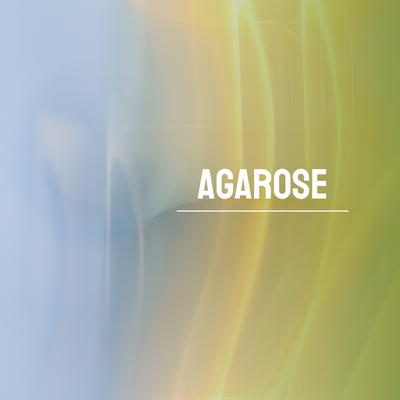
Table of Contents
What is Agarose and Why is it Used?
Agarose is a natural polysaccharide extracted from seaweed, more specifically red algae. It is one of the important constituents used in molecular biology and biochemical laboratories, especially for carrying out gel electrophoresis—a method for the separation of nucleic acids and proteins according to their size and charges. With special features, especially its ability to form a porous matrix in gel form, it enables the separation of molecules of different sizes, thus being able to form an effective molecule for the analysis and purification of nucleic acids.
Agarose for Gel Electrophoresis
In gel electrophoresis, agarose is dissolved in a buffer solution and then poured into a mold to form a gel. The gel becomes like a sieve through which DNA or RNA fragments migrate under an applied electric current. These small molecules migrate faster through the gel than larger ones; thus, this enables separation. Agarose gel electrophoresis has a wide application in genetics research, diagnostics, and forensic science due to its simplicity, reliability, and efficiency in the separation of nucleic acids.
What is Agarose vs Agar?
Both agarose and agar are extracted from red algae but play distinct roles in the laboratory. Agar is a gelatinous substance mainly used as a gelling agent in microbiological culture media. It is a mixture of agarose and agaropectin that confer on it the property for gel formation. Agarose, however, is the fraction of agar that is purified and forms more rigid gels with better resolution, thus more appropriate for electrophoresis techniques. On the other hand, agar is used extensively in microbiology to culture bacteria and fungi, while agarose is used for gel electrophoresis because of high purity and consistency of gel formed.
Is Agarose a Gelatin?
No, agarose is not a gelatin. Gelatin is a protein coming from animal collagen, mainly used in food and pharmaceutical products. In contrast, agarose is a carbohydrate derived from algae. Although both can form gels, the agarose gels are much more stable and have a higher melting temperature than those formed by gelatin. This is why agarose is used in molecular biological applications.
Why is Agarose So Expensive?
Agarose is expensive due to the extraction process from seaweed and specialized purification methods. High purity for molecular biology applications raises the price since every batch is tested for the release of only superior quality products into the market. In addition to its use in specific areas of scientific research, agarose is costly compared to more commonly used laboratory reagents.

Agarose Gel
Agarose gel is the matrix through which nucleic acids are separated using electrophoresis. The agarose concentration in the gel is variably used depending on the size of the molecules to be separated. Higher agarose concentrations produce a denser gel that is better for resolving smaller DNA fragments; lower concentrations are used for larger fragments. The gel structure is porous in such a way that there is a different rate of migration for molecules, thus allowing separation to be done on DNA or RNA samples.
Agarose Powder
This is agarose powder in its raw form. It is added to the buffer solution and melted to form an agarose gel. The powder is normally white and is found in various grades depending on the utilization. Molecular biology-grade agarose powder is refined to an extremely high degree and goes through strict quality control to ensure it is able to perform up to the specifications needed for electrophoresis. It is available in many forms that include low EEO—electroendosmosis—agarose with reduced background staining, ideal for sensitive applications.
Agarose Products by IBI Scientific
IBI Scientific offers a broad array of premium agarose products—from basic agarose and standard agarose to low melt agarose—to fit the vast diversity in life sciences research. Each product is molecular biology grade, fully refined, and subjected to stringent testing to ensure the highest performance with maximum consistency for any application—from standard electrophoresis to separations of nucleic acids by blotting techniques. IBI Scientific offers reliable solutions for all your laboratory electrophoresis needs, with options designed to increase electrophoresis mobility and reduce background staining.


